- Home
- Ty Patterson
Zeb Carter Page 2
Zeb Carter Read online
Page 2
But the villagers didn’t care. Poppy growing gave them a living. Working in the factory gave them a semblance of daily wages.
And even if they wanted to escape, they couldn’t.
Because the Taliban ruled Sori.
Chapter Three
The terrorists had effectively captured the village. To protect it, they said, but the villagers knew they were protecting it for the traffickers who ran the factory and the distribution.
It was not just Sori that the Taliban controlled. They also controlled Mir Darreh and Raghi, the nearest villages, lower down in the valley. There was no other hamlet within a ten-mile radius.
That control and isolation made it an ideal location for both the terrorists and the drug-runners. The former made Sori their camp from which they descended and waged their war against the Westerners. The latter turned the poppy harvest into heroin in the village and smuggled it out to Tajikistan.
The Delta team had been in the valleys hunting for a Taliban commander, Atash Mohammed. The five-member team, led by Chick Roderick, had drifted from village to village in the guise of aid workers.
They had spent two months in Badakshan, keeping their eyes and ears open for any information, any clue, on the warlord.
There were just five because a larger presence would give them away.
The Americans could have shelled the mountains to flush out Mohammed. And maybe that would have worked, but it would have also increased civilian casualties. And, who knows, Mohammed could disappear in one of the many caves in the mountains.
The U.S. Army had learned this the hard way. Earlier, coalition forces consisting of Afghans, Norwegians, Germans, Italians and troops from several other European countries had mounted two operations in Badakshan province to flush out terrorists.
Each operation was successful but after the coalition forces left, the surviving terrorists regrouped, more joined them and they disappeared back into the mountains, from where they waged their war.
Back home, the generals considered their options as they studied the operation, the focus of which was to take out Mohammed, who ruled over the northeastern region of the country.
Eliminating him would cripple the Taliban in the region and achieve a secondary purpose of damaging the narcotics flow from the region.
The generals talked to other coalition army leaders. They talked to the Afghan army.
All agreed it would have to be a small, nimble operation. It wasn’t as if Mohammed surrounded himself with men. It was a guerrilla war he was waging. Sure, he commanded more than a hundred and fifty terrorists, but they were scattered throughout the northeastern provinces.
All intel said that Mohammed had twenty, at most, thirty men with him at any point in time.
Use the terrorists’ tactics against them, the generals agreed. Send in a small, highly mobile force.
But first, they had to know where Mohammed was based.
There was no point in sending an attacking force to comb through the mountains.
So, they sent a recon team.
And that was how Chick, Bud Rohr, Kelly Hobson, Quincy Mayo and Travis Lefkowitz were in Badakshan.
They carried IDs from a prominent charity. They drifted from village to village, trying to pinpoint Mohammed’s exact location.
In the second month, they heard about Sori and about several bearded, armed men in the village, one of whom, their snitch whispered, commanded particular respect.
Okay. That, too, wasn’t uncommon.
Chick plied the informer, Sohrab Humayun, with drink and pulled out several photographs of various Taliban commanders.
Humayun unhesitatingly fingered Mohammed’s picture.
‘You’re sure?’ Chick looked searchingly in the black eyes opposite him.
‘Yes, sir.’ The snitch’s teeth were dark and stained. He ran what passed for a general store in Raghi. It was the largest in the region, and he frequently went up into the mountains with supplies. He was a well-known figure in the community.
‘How long?’
The informer shook his head. He didn’t understand.
‘How long will he be there? How many men does he have? What are his movements?’
Humayun said it would take him a few days, maybe as much as a week, to get that information. He couldn’t ask the terrorists straight out, could he?
The informer returned in ten days. Mohammed rarely left the village, he told them. Instead, he used burner phones and messengers to communicate.
He told the Delta team everything that he knew. His eyes dilated when Chick casually drew his Glock and placed it on the table.
‘I don’t play both ways,’ he said, shrinking away from the gun.
‘We know,’ the team leader said, and left it at that. Message delivered and received.
The operatives went to Sori the next night.
They drew up to the base of the mountain on which Sori’s shabby buildings rose, in the aid organization’s Jeep and started climbing.
They avoided the narrow path that wound up to the peak and took to the rocky hillsides.
They wore dark clothing: tonbaan , the long baggy pants worn by Afghani men, with a perahaan , the loose shirt that dropped to the knees. Armor beneath their shirt, boots instead of the chaplee that the local men wore.
They split up, maintaining comms contact. Moving easily, their weapons on their backs. HK416s, Glocks, blades, ammo, blood packs, grenades.
Chick and Bud would approach the village from the front. The rest would enter from behind. They would draw a detailed layout of the village.
Sure, they had maps of the village. Choppers had flown over Sori several times. They had produced high-res images.
But the informer said there were several secret alleys concealed by the almost-touching overhanging roofs of the houses. Some of those could be routes to escape to tunnels and therefore, the night recon.
During the day, they would hide themselves on the side of the mountain and mount a vigil in hopes of getting eyes-on confirmation of Mohammed.
They hadn’t climbed halfway up when their plan went south.
Chapter Four
Concentrated firing broke out from behind several large rocks above them.
‘COVER! ’ Chick hissed and dove behind an outcrop.
His HK slipped to his hands. Took out a shadow that was racing down.
He felt a sinking feeling in his stomach when he saw numerous figures running down the mountain.
Firing filled the dark of the night. Five Delta operatives against what seemed like hundreds of Taliban.
The Afghans had the high ground. The Americans were disadvantaged not just by numbers but by terrain.
‘FALL BACK!’
They could still make it to their Jeep, on which heavy armaments were hidden.
More terrorists went down as Chick and his men laid down lethal fire and then a fighter leaped over his cover. The operative chopped him down with a hail of rounds.
More men appeared and Chick swung, fired, knocked and thrust his HK. In his peripheral vision he saw Bud and Kelly were similarly occupied. He couldn’t see Travis or Quincy.
A blow to his temple brought him to his knees.
Why haven’t they killed us? he thought, just before he lost consciousness.
The Taliban wanted hostages. Mohammed wanted to make Sori impregnable. What better way than to hold American prisoners in the village? Any U.S. or coalition attack would be hampered by the operatives’ presence.
Zeb ran through Central Park. New York. Home.
He had returned from DC the previous night and had gone about his day, which started off with a run.
He knew what had gone down that night in Sori. Everyone knew. The Taliban had made a big deal of the capture of the operatives.
Quincy and Travis had escaped. They had started retreating as soon as Chick had given the order. Loose stone underneath their feet had made them slip and the momentum had carried them down quickly.
&n
bsp; They both were hit while escaping. Quincy took a round through his left thigh. Travis had his upper right arm perforated.
But they had managed to struggle back to the Jeep, chased by Taliban. Quincy took their vehicle off the rutted path as the terrorists opened fire.
Rounds struck it, as he drove deeper into the woods.
He saw the fallen tree too late. They crashed into it, their heads knocking against the windshield and lost consciousness.
An animal herder found them an hour later, as dawn was breaking.
The U.S. forces and coalition forces had both mounted rescue operations. Three of them, with heavy airfire to support ground troops.
Mohammed and his men disappeared into the caves of the mountains, along with their captives.
Meanwhile, the Taliban made a show of laying out bodies on the ground and inviting the world’s press to view them. Civilian casualties, they said, killed by the barbaric Westerners.
Two months had passed and no progress had been made to rescue Chick, Bud and Kelly.
The terrorists posted their pictures occasionally. Gaunt, haggard bodies; marks on their faces to hint at torture.
The Americans tried diplomatic efforts. They failed. The Taliban were well entrenched in Badakshan. Mohammed was a highly popular commander. There was no way they were going to release the prisoners.
Zeb took a deep breath and cleared his mind. He upped his pace. In, out. In, out. Smooth, long paces that covered the ground effortlessly.
After a few minutes, he saw three figures in the distance. Two large men, a smaller one beside them.
Bwana, his ebony face breaking into a smile when he turned to see who was following them. Bear, built like a mountain, with a well-trimmed beard and Roger, handsome like a model, a Texan who didn’t let anyone forget it.
Zeb joined them and they ran in silence for a while, comfortable in one another’s company.
All four were former Delta operators. Friends. All of them were pursuing similar careers on leaving the military.
Private military contractors.
All were choosy about the assignments they accepted. Nothing that would risk national security. No operation that would harm innocents.
Zeb was freshly returned from Russia, where he had taken care of a prominent mafia boss who was smuggling NATO weapons: an assignment sponsored by one of the three-letter-acronymic agencies in DC.
‘How did it go?’ Bear rumbled. He was referring to the interview.
‘They said they would let me know.’ Zeb briefed them quickly.
The unusual request had reached him through a military contact, a colonel who sometimes offered him work.
The brief said the Pentagon was looking for an exceptional operator. Someone who was independent, not a current serving member in the armed forces.
‘Delta has enough operatives. There are the SEALs. Other specialist units. Why me?’ Zeb had questioned.
‘Not just you. I am reaching out to a few other people.’
‘How many?’
‘Four others. Similar background to yours.’
‘What’s this about?’
‘Can’t say.’
‘Can’t, or won’t? You’ve known me long enough.’
‘It will be cold,’ the colonel relented and then clammed up.
Zeb’s friends hadn’t applied because they didn’t speak Pashtun. That was one of the requirements the colonel had specified.
‘You really think we’ll send just one person? On a rescue mission?’
‘If it is what we think it is … yeah. All other approaches seem to have failed.’
‘I am sure you’ll be selected,’ Bwana grinned.
Two heads nodded in agreement.
They knew their friend.
They knew what Zeb Carter was capable of.
Chapter Five
The suits considered the five candidates. All were impressive. Their files were thick with their exploits in distant locations in hostile situations. The details included their missions while in the military, as well as operations as private contractors.
One had been in a team that took out an African dictator who had started a regional conflict. Another had eliminated a Mexican drug lord.
‘Don’t like him,’ Silver Hair said dismissively when they discussed Zeb Carter. All files were labeled numerically in interviewing order. Number Five had ZC scribbled on it. He was the only candidate of whom they had asked a name.
‘He’s got an attitude. He’ll stick out like a sore thumb in ’Stan.’
‘He’s been in covert operations. He was in-country, under cover, in Libya for a year,’ Squat Suit said in defense. ‘I am sure he knows how to conduct himself when deployed.’
‘He’s a loner. You’ve seen his file. Works well in a team but prefers to work alone.’
‘He will be alone in ’Stan,’ the balding man sighed and rubbed his eyes. ‘Quit griping, Klein. You didn’t like the stripping act? Well, I did. It showed unconventionality. A willingness to do some lateral thinking and lot of that will be required if he goes.’
That stopped Klein, the silver-haired man. They were all equal but Speer, the bald suit, was more than that. He was rumored to be liked by the president. If that was true … ‘He knows more languages than the others,’ Klein accepted, grudgingly.
‘Yes. Pashto, which all of them speak. But Carter also knows Farsi, Tajiki and Pamiri. Which is important.’
Because Badakshan had more Tajiks than Pashtuns. There were Pamirs and Uzbeks as well.
‘I like that Libya operation,’ Squat spoke up again. ‘He lived as a goat herder. Got close to Waseem al Hamad’s camp in the desert. Took him out one night. Escaped. No support, nothing from us,’ he shook his head admiringly.
Speer sensed the shift. ‘We’re all agreed? Carter?’
A chorus of yeahs.
‘I’ll speak to Kilmer. He’ll progress.’
Kilmer, the colonel, met Zeb in a café in Foggy Bottom, two days later. Both were in civilian clothing, but their short hair and erect postures hinted at their military backgrounds.
The officer waited until their server brought their order. He poured steaming coffee into two cups and pushed one toward Zeb.
‘You look well,’ he said, casting a critical eye over the younger man. ‘I heard the Russian job went well.’
‘Was it through you?’ Zeb looked at him curiously through gently rising wisps of steam. ‘Another middle man offered it to me.’
‘Not me,’ the colonel said firmly. ‘We like the outcome, obviously,’ he said drily.
He took a long pull, looked around casually and then reached for his briefcase. He opened it and pulled out a thick file.
‘Atash Mohammed. Everything we have on him and on Sori, Badakshan, that Delta operation. The job’s yours. If you want it.’
Zeb didn’t open the folder. ‘Those men … I recognized one of them. Speer. He’s the commander of SOCOM. I reckon the others were his peers. If the military wanted to send someone like me, an expendable resource, why interview us?’
He spoke with no bitterness. He had been in the game long enough to know how it was played. Mercenaries were disposable resources.
‘That was Speer’s idea. He has this thing about honor,’ Kilmer sighed heavily. ‘Zeb, you know chances of success … of survival on this operation are low. Practically nonexistent. What can one man do that the U.S. military couldn’t?’
‘Yeah, I know.’
‘Well, Speer wanted him and the others to look the men in the eye. And to live with their decision, if the selected candidate never came back.’
‘They make such decisions regularly.’
‘The difference is, this time, you will be on your own. No air support. No comms support. No U.S. involvement. Total deniability. You can back out,’ the colonel said, eying the untouched file.
‘What happens if I do?’
‘Nothing, to you. Speer and the others will not go to the other candidates. They
won’t go second choice. We’ll have to figure out how we can rescue our men.’
‘That might take a long time.’
‘Yeah.’
A motorcade of vehicles rushed past outside. Police escorts and outriders clearing the way for black SUVs and limos. Traffic scattered and regrouped when the convoy had passed.
Life in DC. Politics was in the air.
‘Something else struck me.’ Zeb’s words drew the colonel’s attention back.
‘What?’
‘I was thinking Mohammed kept our operatives alive because having them would protect him. Their presence will constrain our actions.’
‘Yes. That’s what we believe, too.’
‘But that hasn’t stopped him from killing other prisoners. Remember Hawkins? Jones?’
The Taliban commander had executed two captured American soldiers the previous year. The killing had made headlines around the world. It was followed by intensive bombing and ground operations by U.S. and coalition forces in Badakshan province.
Mohammed had escaped into his caves and had survived.
‘He is a master strategist. And a survivor.’ He looked up sharply. ‘He, the Taliban, aren’t negotiating with us for a prisoner exchange?’
Kilmer shook his head. ‘Nope. That would never happen.’
Zeb’s frustration showed in his voice.
‘So, why are our operatives alive?’
Chapter Six
Zeb and Kilmer thrashed it around for another hour. Neither came up with any answers.
Zeb took the folder and rose. Kilmer rose, too.
‘There’s one more thing,’ the colonel said, stopping him. ‘In about a month’s time, five weeks precisely, coalition forces will begin a significant assault on the Taliban. On all fronts. Kandahar. Badakshan. Everywhere.’
Zeb knew what he meant. Any rescue attempt would have to happen before that. Otherwise, not only would escape be more difficult, there was a real chance Mohammed would execute the prisoners.
‘You aren’t making this easy, are you?’ he grinned as he followed the colonel out.
‘We wouldn’t have come to you if it was,’ Kilmer retorted.
He gripped Zeb’s forearm and looked deep into his eyes.
‘Come back. Alive. With them.’
Zeb reached his place in New York’s Jackson Heights neighborhood that evening.

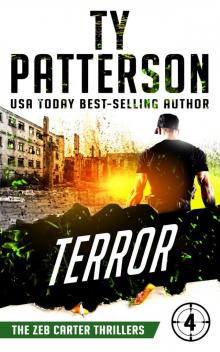 Terror: Zeb Carter Series, Book 4
Terror: Zeb Carter Series, Book 4 Powder Burn
Powder Burn Gemini Series Boxset
Gemini Series Boxset RUN!
RUN!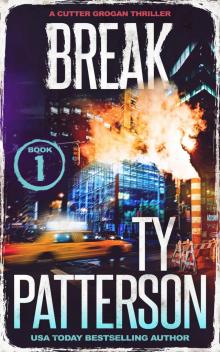 Break
Break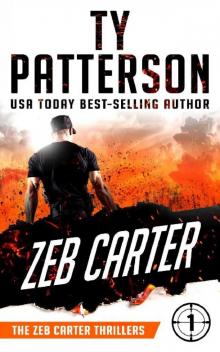 Zeb Carter
Zeb Carter Wrecking Team_A Gripping Mystery Suspense Novel
Wrecking Team_A Gripping Mystery Suspense Novel The Warriors Series Boxset II
The Warriors Series Boxset II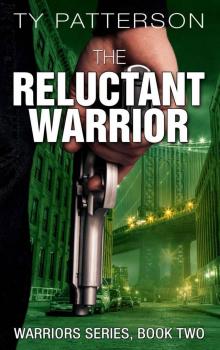 The Reluctant Warrior (Warriors Series Book 2)
The Reluctant Warrior (Warriors Series Book 2) Wrecking Team
Wrecking Team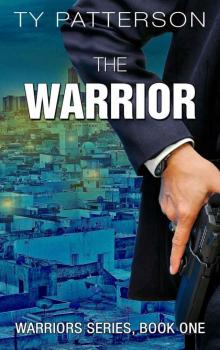 The Warrior (Warriors Series Book 1)
The Warrior (Warriors Series Book 1) Dividing Zero
Dividing Zero The Warriors Series Boxset I
The Warriors Series Boxset I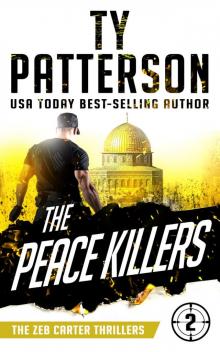 The Peace Killers
The Peace Killers Wrecking Team: A Gripping Mystery Suspense Novel (Gemini Series of Thrillers Book 4)
Wrecking Team: A Gripping Mystery Suspense Novel (Gemini Series of Thrillers Book 4) Death Club
Death Club Trigger Break
Trigger Break